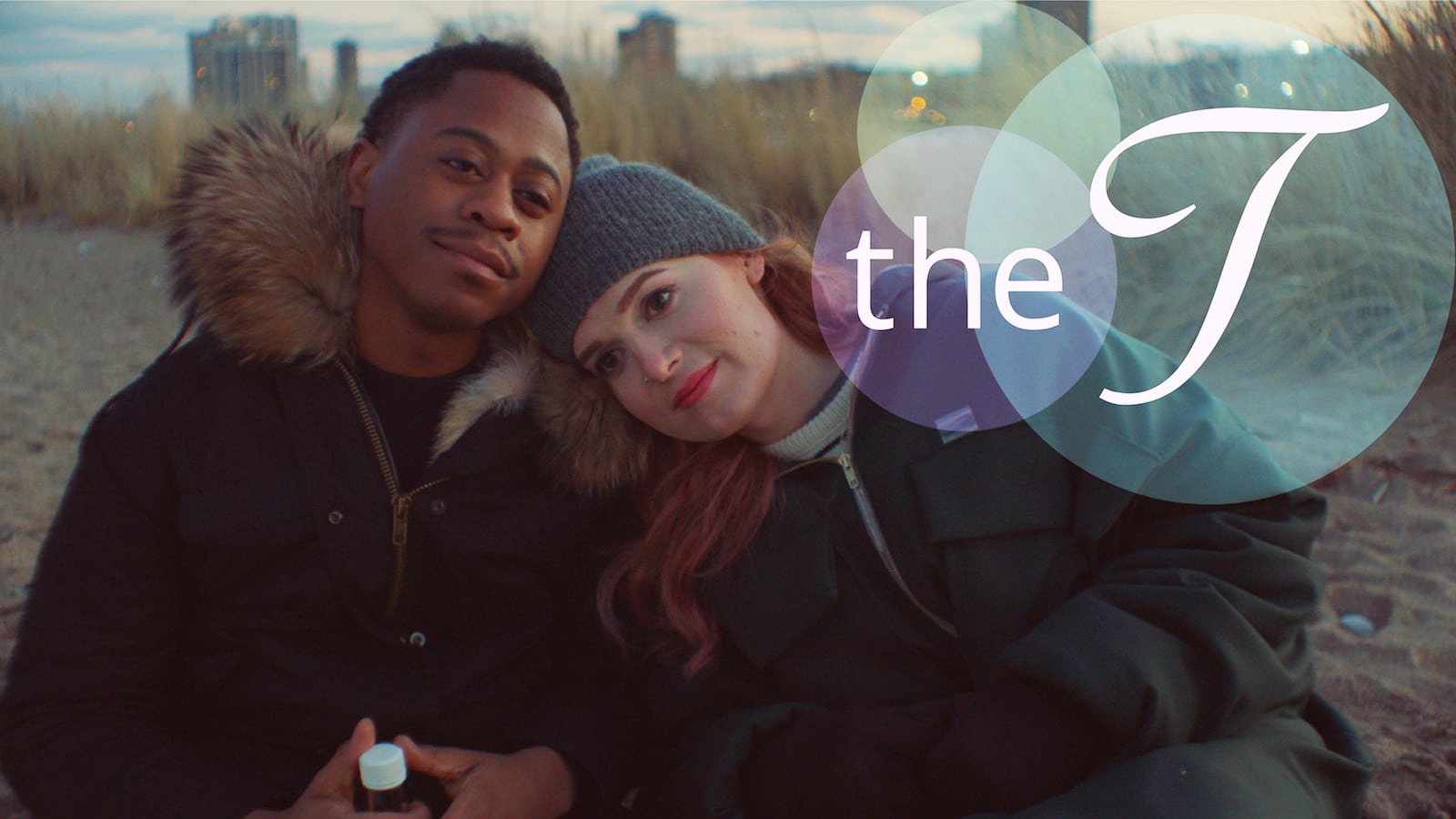Too many stories about queer and transgender people are still primarily about suffering—especially those told on film and TV.
GLAAD has repeatedly called out TV shows for killing off LGBTQ characters in order to advance other characters’ storylines. Even though transgender representation is gaining a foothold in film, the resulting projects are often challenging viewing: Empire reviewer Helen O’Hara, for example, called the Chilean film A Fantastic Woman “Microagressions: The Movie,” given how much pain its transgender lead endures.
That’s why new web series the T, created by Chicago-based filmmakers Bea Cordelia and Daniel Kyri, is so rare—and so refreshing: It shows queer and transgender people dealing with real human problems, yes, but still just living.
“As a trans woman myself, and for Daniel as a queer black man, we’re all too acquainted with the stories people tell about us that are tragic and reductive and that often come as a punchline to someone else’s story,” Cordelia told The Daily Beast. “We wanted to create something that was more sincere to our experiences.”
Across six episodes, the T tells the story of Jo (Cordelia) and Carter (Kyri), best friends in Chicago who dated before Jo’s transition—and who now must reconcile with their shared past as they support each other in the present. The first episode shows Jo and Carter attending a New Year’s Eve party together, sharing a confusing midnight kiss.
The T trailer from OTV | Open Television on Vimeo.
The series as a whole tackles serious subjects like homophobia and the stigma around dating a transgender person, but it doesn’t do so at the expense of showing the little joys of queer life: the hugs, the knowing looks, the sometimes mirthless laughter.
“Something that Bea and I aim to do is create space for folks like us to express the full range of our humanity without having to apologize for it,” Kyri told The Daily Beast. ‘The pain, but also the joy, the extraordinary, but also the mundane.”
The beautiful onscreen friendship between Jo and Carter is informed by the real-life friendship between Cordelia and Kyri, who first met in a summer arts program when they were 17 years old—before Cordelia’s transition—and briefly dated before losing touch.
“We didn’t cross paths again until after college,” Cordelia told The Daily Beast. “By that time I was trans, and we were both working professionally in [Chicago], and we became artistic acquaintances of sorts.”
Kyri developed what he calls an “art crush” on Cordelia after the two became re-acquainted and then he “got up the nerve to slide into her DMs with a pitch for a TV show” about the friendship between a white transgender woman and a queer black man.
Cordelia’s response made their collaboration on the T seem like destiny: “I told him that I’d already written that, sent him the pilot, and the rest is history!”
You can watch the first episode below (warning: there is some swearing).
the T - Episode 1 from OTV | Open Television on Vimeo.
Making the web series required grassroots and community support. A successful Kickstarter campaign raised over 20 thousand dollars for production—and a grant from the Chicago Film Office named the pair Chicago’s 2018 Filmmakers in Residence. The series was shot on location in places like the Chicago Cultural Center and the shore of Lake Michigan.
“Chicago artists are some of the hardest working people in the world and we all wear many hats,” Kyri told The Daily Beast. “When you don’t live in a place that has as many resources or access as, say, LA or New York City, you have to make your voice heard by any means necessary.”
Kyri, who primarily works as an actor, told The Daily Beast that even though more film and TV projects are shooting in Chicago in recent years, he still has a hard time finding roles that aren’t “steeped in stereotype or just flat out inaccurate.” TV and film roles for transgender people are also sparse—and with exceptions like the new FX series Pose—are often given to cisgender actors instead.
“So what do you do when you’re a queer Black boy from the Southside or a trans woman and no one seems to be telling your story?” asked Kyri. “You write it yourself. And you may also have to produce it and direct it to show folks how it’s done.”
Indeed, Cordelia and Kyri would caution anyone celebrating milestones in LGBT media representation like Pose to hold the champagne until there are more than a handful of positive examples to cite.
According to the latest GLAAD report on LGBT representation in TV, there were only 17 transgender characters on TV in the 2017-2018 season with regular or recurring roles—and only 40 black LGBTQ characters. LGBT representation on the big screen is even worse, with the official GLAAD tally showing that only 14 major studio films had LGBT characters last year—down from 23 in 2016.
“When you go from almost no representation to a tiny bit of representation, it’s easy to call that huge because it’s more than you’ve ever seen,” Cordelia told The Daily Beast. “Is it enough? No. I still have to hunt down TV shows and films with positive trans representation because there are so few.”
Even those few examples of media representation for transgender people or queer people of color can leave something to be desired. Indeed, transgender characters are often reduced to their gender identity and LGBT people of color to their race rather than being depicted as fully fleshed-out human beings.
As GLAAD’s most recent TV report pointed out, for example, it seems like some show creators “haven’t given much thought to the fact that trans people also have sexual orientations.”
Against that backdrop, the T shines especially bright, giving us a transgender character in Jo who has sexual relationships and a queer black, character in Carter who has rich depths that can only begin to be explored across the forty or so minutes of the show’s first season. The result is revelatory in a quiet way—an intimate, finely-textured portrayal of a friendship between two people who are rarely seen onscreen.
It’s exactly the sort of approach to LGBT representation that should be imitated—and Cordelia and Kyri hope that other creators will do just that.
“the T is a way for us to lead by example” said Kyri. “It really is very simple: The world we see in the media should reflect the one we live in—one that is infinitely more complex than what is currently afforded to us.”






